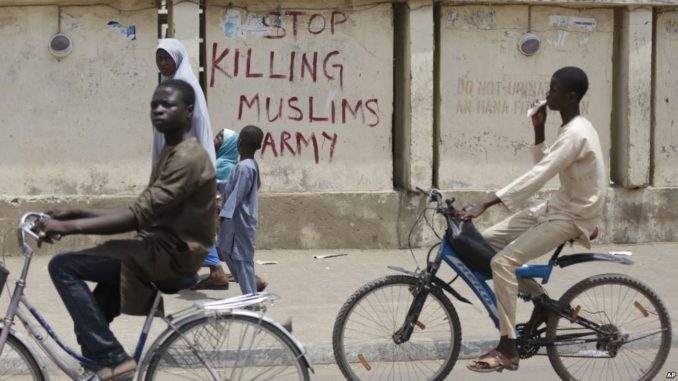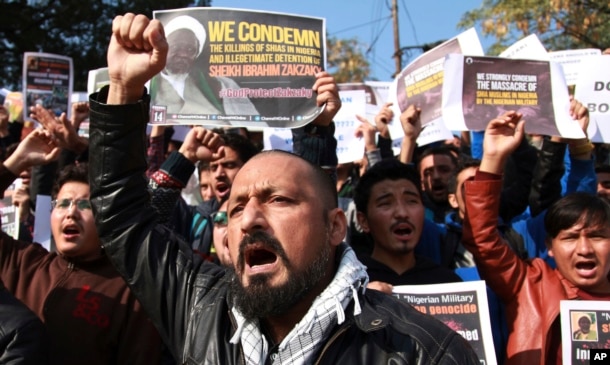
ABUJA, NIGERIA — Members of Nigeria’s largest Shi’ite Muslim group say they still are being unjustly targeted by the Nigerian government and security forces, with 44 Shi’ite Muslims arrested last week as hundreds gathered in Jos, in the Nigerian state of Plateau, for a religious ceremony called the day of Ashura.
Saifullah Kabir’s mother was one of those arrested.
“I visited her one time; that was last week,” Kabir said. “She said she don’t know what offense she has done.”
Meanwhile, Kabir’s two sisters, ages 16 and 14, are in police detention.
Plateau state police spokesman Tyopev Terna says those detained were charged with public disturbance. Minors are being held in a cell in a police station while the adults, like Kabir’s mother, are in prison.

FILE – Muslims students carry placards and shout slogans against the Nigerian government after the killings of hundreds of Shi’ite Muslims and the detaining of their leader Ibraheem Zakzaky in Nigeria, in Jammu, India, Dec. 15, 2015.
“They are with us on court order,” Terna said. “We are not the ones keeping them. It is the court that said they should be taken to prison. The prison said, help us with your facilities so we can keep them there. They are in safe hands. They are in a very good facility.”
The activities of Nigeria’s largest Shi’ite group, the Islamic Movement of Nigeria, were recently banned in the neighboring state of Kaduna.
For decades, the group has experienced tension with the Nigerian government and security forces. In December 2015, 347 Muslims were killed after a clash with Nigerian soldiers at IMN headquarters in the city of Zaria.
“They killed women and children,” said Ibrahim Musa, the spokesperson of IMN. “They burned some alive. They destroyed properties. Our people were mercilessly killed and dumped into a mass grave.”
Musa, who spoke to VOA from an undisclosed location, has been in hiding since the Kaduna state government issued an order for his arrest October 7.
Musa says he and other Shi’ite Muslims believe they are being targeted because of their faith — and fear that radical Sunni Muslims are behind the attacks on Nigeria’s Shi’ites.
During a visit to Nigeria last week, the U.S. undersecretary of civilian security, democracy and human rights, Sarah Sewall, told VOA she is worried that what she calls a repression of faith could instigate a larger conflict in the future.
“The United States has expressed its concerns and has raised these at the highest levels of the Nigerian government and military,” Sewall said.
